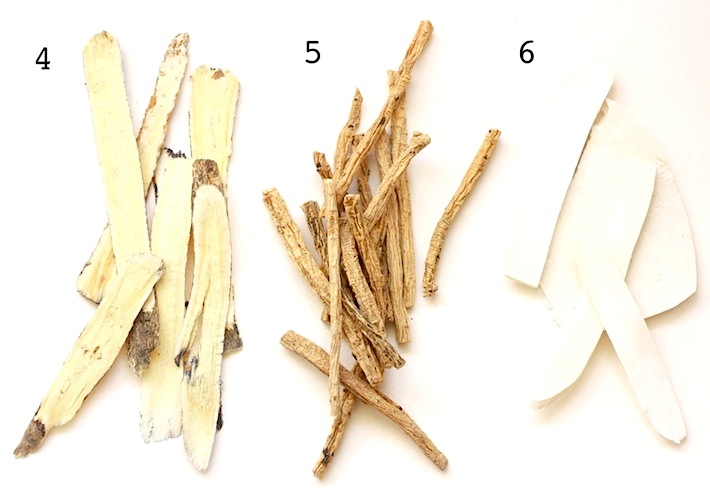Are Chinese medicinal herbs safe? Are they effective? What are Chinese herbs? Do I cook with them? Are Chinese herbs edible?
Chinese Herbal Medicine has been developed over thousands of years into a complex system of maintaining good health, and when necessary, restoring health. The practice can vary widely, but to clarify some misconceptions, let’s focus on a mainstream, contemporary view of Chinese herbal medicine:
- There are thousands of Chinese herbs, but only a hundred or so are commonly used. They are mostly plant-based like roots, rhizomes, bark, flowers, fruits, nuts, etc. And include many familiar spices like ginger, black sesame seeds, turmeric, nutmeg, clove, and star anise.
- ‘Chinese herbs’ does not necessarily mean the herbs have originated in China - only that they are used in Chinese herbal medicine.
- The term ‘medicinal herbs’ can be misleading too. Most Chinese herbs can be considered more as a vitamin than as a medicine. Therefore, Chinese herbs play an important part in a daily diet to sustain good health, in order to prevent rather than treat disease.
- The common Chinese medicinal herbs have been used safely for thousands of years because most are plant-based items like the spices in your kitchen. However, if you are pregnant, on medication, or have a specific medical condition, check with your doctor before adding Chinese herbs to your diet – like you would for other food items you haven’t taken before.
- Most Chinese herbs are not meant to be eaten. They will generally be boiled in water to extract the nutritional and medicinal benefits – as well as the flavor - and served as a soup or tea. The boiled herbs will then be discarded.
- Chinese herbs are generally more effective when combined, compared to taking them individually. Therefore, it is best to consult a qualified and experienced practitioner of Chinese herbal medicine to determine the most effective herbal blends.
The following 15 herbs are a sample of common herbs used today in Chinese herbal medicine.
Some of these Chinese herbs strengthen the heart, liver, kidneys, spleen, or lungs. Others aid the digestive system or boost the immune system. While others relieve pain or inflammation, or improve vision or blood circulation. They vary widely in their nutritional and medicinal benefits, but they are all valuable in maintaining a healthy life to prevent disease.*
1. Cassia (Cinnamomum aromaticum or Cinnamomum burmannii)
- Chinese name: 肉桂 Rou Gui
- Potential medicinal benefits of Cassia - improves cognitive skills like memory and concentration, increases blood circulation, aids digestion, reduces blood sugar level
2. Wolfberry / Goji Berry (Lycium barbarum)
- Chinese name: 杞子 Gou Qi Zi
- Potential medicinal benefits of Goji Berry – boosts immune system, prevents iron deficiency, reduces cholesterol, lowers blood pressure, strengthens liver and kidneys, improves vision
3. Lotus Seed / Lotus Nut (Nelumbo nucifera)
- Chinese name: 莲子 Lian Zi
- Potential medicinal benefits of Lotus Seed – boosts immune system, lowers blood sugar level, reduces hypertension, strengthens spleen, kidney and heart
4. Milkvetch Root (Astragalus membranaceus)
- Chinese name: 北耆 Huang Xi
- Potential medicinal benefits of Milkvetch Root – strengthens spleen and lungs, boosts immune system, increases production of white blood cells
5. Pilose Asiabell Root / Poor Man’s Ginseng (Codonopsis pilosula)
- Chinese name: 党参 Dang Shen
- Potential medicinal benefits of Pilose Asiabell Root – strengthens lungs, nourishes blood, improves digestion system
6. Chinese Yam / Nagaimo (Dioscorea opposita)
- Chinese name: 淮山 Huai Shan
- Potential medicinal benefits of Chinese Yam – aids digestion, improves GI tract, boosts immune system, reduces blood sugar levels, strengthens spleen and kidneys
7. Ginkgo Nut (Ginkgo biloba)
- Chinese name: 白果 Bai Guo
- Potential medicinal benefits of Gingko Nut – strengthens lungs and kidneys, relieves cough, improves circulation
8. Asian Ginseng (Panax ginseng)
- Chinese name:人参 Ren Shen
- Potential medicinal benefits of Asian Ginseng – boosts immune system, lowers cholesterol, reduces stress, improves cognitive skills, increases stamina, lowers blood sugar level of diabetics, protects the heart
9. Red Dates / Jujube (Ziziphus zizyphus)
- Chinese name: 紅棗 Hong Zao
- Potential medicinal benefits of Red Dates – strengthens spleen, stomach and liver, nourishes the blood, increase metabolism, detoxifies the body, reduces stress and prevents insomnia, boosts immune system, rich in antioxidants to prevent cancer
10. Star Anise (Illicium verum)
- Chinese name: 八角 Bajiao
- Potential medicinal benefits of Star Anise – treats rheumatism, aids digestion, prevents influenza (star anise is a key ingredient in the antiviral drug Tamiflu)
11. Solomon's Seal (Polygonatum odoratum)
- Chinese name: 玉竹 Yu Zhu
- Potential medicinal benefits of Solomon’s Seal – fights diabetes, strengthens stomach and lungs
12. Foxnut (Euryale ferox)
- Chinese name: 芡實 Qian Shi
- Potential medicinal benefits of Foxnut – strengthens kidneys and spleen
13. Black Sesame Seed (Sesamum indicum)
- Chinese name: 黑芝麻 Hei Zhi Ma
- Potential medicinal benefits of Black Sesame Seeds – lowers cholesterol, detoxifies the body, strengthens the liver and kidneys, improves GI tract, high concentration of minerals to strengthen bones and muscles, improves vision
14. Dried Lily Bulb (Lilium brownii)
- Chinese name: 百 合 Bai He
- Potential medicinal benefits of Dried Lily Bulb – strengthens heart and lungs, relaxes the nerves, treats insomnia, boosts immune system, suppresses cough and treats sore throat
15. Ginger / Ginger Root (Zingiber officinale)
- Chinese name: 姜 Sheng Jiang
- Potential medicinal benefits of Ginger – aids digestion, protects stomach lining, reduces nausea, detoxifies the body, reduces anxiety, lowers fevers, treats rheumatism, lowers cholesterol, suppresses cough, cures hiccups, reduces symptoms of motion sickness and morning sickness
*On Season with Spice, we can not claim to the overall effectiveness of Chinese herbal medicine, but we do share in one of its basic, universal messages - that spices & herbs are an essential part of the daily diet in order to lead a healthy life and prevent disease.









